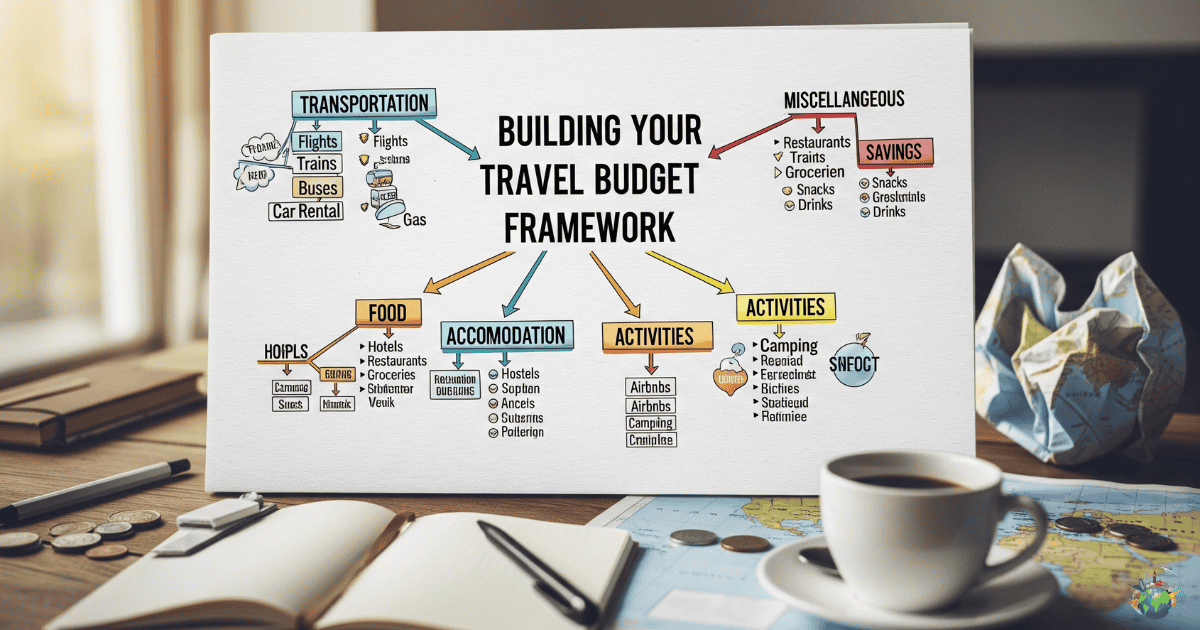You’ve booked your flights, researched accommodations, and created the perfect itinerary. But there’s one crucial step that often gets overlooked until it’s too late: creating a realistic travel budget. Without proper trip cost planning, even the most carefully planned vacation can turn into a financial nightmare that haunts you long after you’ve returned home.
A well-crafted budgeting for travel plan isn’t just about restricting your spending—it’s about maximizing your experiences while staying financially responsible. When done correctly, budget travel tips can help you stretch your dollars further, allowing you to take more trips or splurge on the experiences that matter most to you.
This comprehensive travel expenses guide will walk you through every step of creating a travel budget that not only works on paper but actually holds up during your trip. You’ll learn practical strategies to save money on trips without sacrificing the quality of your experience, discover hidden costs that catch most travelers off guard, and master the art of affordable travel planning.
Understanding the True Cost of Travel
Before diving into budget creation, you need to understand what actually costs money when you travel. Many first-time budget planners focus solely on the big-ticket items like flights and hotels, but successful trip cost planning requires accounting for every expense category.
The Big Four: Major Travel Expenses
Transportation typically represents the largest chunk of your travel budget. This includes not just your flights or train tickets to your destination, but also local transportation like taxis, public transit, rental cars, and ride-sharing services. International travelers should also factor in visa fees and travel insurance.
Accommodation costs vary dramatically based on your destination and travel style. While hotels are the obvious choice, consider alternatives like vacation rentals, hostels, or even house-sitting opportunities that can significantly impact your overall budget.
Food and dining expenses often surprise travelers with how quickly they add up. Restaurant meals, especially in touristy areas, can easily consume 30-40% of your daily budget if you’re not careful.
Activities and entertainment round out the major expense categories. This includes everything from museum admissions and tour fees to shopping and nightlife expenses.
The Hidden Costs That Derail Budgets
Successful budget travel tips always emphasize the importance of planning for unexpected expenses. Currency exchange fees can add 2-5% to every transaction when using foreign ATMs or paying with credit cards that charge international fees.
Baggage fees, seat selection charges, and in-flight purchases can turn a budget airline ticket into an expensive mistake. Always read the fine print and factor in these additional costs when comparing travel options.
Tips and gratuities vary by country and culture, but they’re often mandatory in practice. Research local tipping customs to avoid awkward situations or budget overruns.
Emergency expenses happen more often than travelers expect. Whether it’s a missed connection requiring an overnight hotel stay or a medical issue requiring pharmacy visits, having a buffer for unexpected costs is crucial for maintaining your travel budget.
Setting Realistic Budget Goals
Creating an effective travel budget starts with honest self-assessment and realistic goal-setting. Many travelers sabotage their budgets from the start by setting unrealistic expectations based on outdated information or wishful thinking.
Researching Destination Costs
Thorough research forms the foundation of accurate trip cost planning. Start by consulting multiple sources for cost information, including travel blogs, official tourism websites, and apps like Numbeo or Trail Wallet that provide real-world pricing data from other travelers.
Pay attention to seasonal price variations. Visiting Europe in summer versus shoulder season can double your accommodation costs, while traveling to Southeast Asia during monsoon season might save money but impact your experience.
Consider the local economy and exchange rates. A destination might seem affordable based on exchange rates, but if it’s experiencing inflation or economic instability, your dollars might not stretch as far as expected.
Determining Your Travel Style
Your personal travel style dramatically impacts how much you’ll spend, and honest self-reflection is essential for creating a realistic travel budget. Budget travelers who prioritize experiences over comfort can often manage on $30-50 per day in many destinations, while luxury travelers might spend ten times that amount.
Consider your non-negotiables versus nice-to-haves. Maybe you’re happy sleeping in hostels but refuse to skip that cooking class in Tuscany. Or perhaps you need private accommodation but are perfectly content eating street food. Identifying these preferences helps you allocate your budget appropriately.
Think about your energy levels and vacation goals. If this is your only vacation this year and you want to relax, splurging on a nicer hotel might be worth the extra cost. If you’re taking multiple trips, you might prefer to save money on trips by accepting more basic accommodations.
Building Your Travel Budget Framework

Once you understand your costs and goals, it’s time to create the actual budget structure. A good framework should be detailed enough to provide guidance but flexible enough to adapt to changing circumstances.
The 50/30/20 Travel Budget Rule
Adapt the popular personal finance rule to travel budgeting. Allocate 50% of your budget to necessities (flights, accommodation, meals), 30% to activities and experiences, and 20% to a contingency fund for unexpected expenses or opportunities.
This framework ensures you don’t overspend on any single category while maintaining flexibility for the experiences that make travel memorable.
Daily Budget Breakdown
Creating a realistic daily budget helps you track spending in real-time and make adjustments before small overages become major problems. Start with your total budget, subtract fixed costs like flights and accommodation, then divide the remainder by the number of travel days.
Break your daily allowance into categories: meals, local transportation, activities, and miscellaneous expenses. Having specific targets for each category makes it easier to make smart spending decisions on the fly.
Buffer Fund Strategy
Smart budget travel tips always emphasize the importance of building in financial cushions. Aim for a 15-20% buffer above your calculated expenses. This emergency fund covers unexpected costs without derailing your entire budget.
Consider keeping your buffer fund in a separate account or envelope to avoid accidentally spending it during normal trip activities. This psychological separation makes it easier to reserve the money for true emergencies.
Pre-Trip Money-Saving Strategies
Saving money on trips starts long before you leave home. Strategic planning and advanced preparation can significantly reduce your travel expenses without impacting the quality of your experience.
Booking Strategies That Save Money
Timing your bookings correctly can save hundreds of dollars on flights and accommodation. For domestic flights, Tuesday afternoons often offer the best deals, while international flights are typically cheapest 6-8 weeks in advance.
Use flexible date searches and consider flying midweek or during off-peak hours. The savings from taking a 6 AM flight versus a 6 PM flight can be substantial, especially on popular routes.
Compare total costs, not just headline prices. A budget airline charging for carry-on bags and seat selection might actually cost more than a full-service airline when you add up all the fees.
Accommodation Hacks
Location strategy can dramatically impact your accommodation costs. Staying slightly outside city centers often provides significant savings, especially if public transportation is reliable and affordable.
Consider alternative accommodations that align with affordable travel principles. Vacation rentals can be cost-effective for longer stays or group travel, while hostels aren’t just for college students—many now offer private rooms at competitive prices.
Book directly with hotels after comparing prices online. Many hotels will match online prices and throw in perks like free Wi-Fi, breakfast, or room upgrades for direct bookings.
Transportation Savings
Ground transportation often offers better value than flying for shorter distances. Trains, buses, and even rental cars can be more economical when you factor in airport fees, baggage costs, and travel time to airports.
Public transportation passes provide excellent value in most major cities. Research multi-day passes that include buses, trains, and sometimes even attractions.
Walking and cycling aren’t just budget-friendly—they often provide more authentic cultural experiences than riding in taxis or tour buses.
Managing Money During Your Trip

Even the best pre-trip planning falls apart without proper execution. Successful budget management during your trip requires the right tools, strategies, and mindset.
Daily Tracking Systems
Choose a tracking method that fits your travel style and stick with it consistently. Simple smartphone apps like Trail Wallet or Trabee Pocket work well for basic expense tracking, while more detailed spreadsheet systems suit travelers who want comprehensive analysis.
Record expenses immediately rather than trying to remember them later. Keep receipts and update your tracking system each evening when the day’s activities are fresh in your memory.
Review your spending weekly on longer trips. If you’re over budget in one category, identify areas where you can cut back without significantly impacting your experience.
Smart Spending Strategies
Prioritize experiences over things when making spending decisions. The memories from a cooking class or guided tour typically provide more lasting value than souvenirs that gather dust at home.
Take advantage of free activities and attractions. Most destinations offer free walking tours, public beaches, parks, hiking trails, and cultural events that provide authentic experiences without straining your travel budget.
Time your splurges strategically. If you want to try an expensive restaurant, consider going for lunch instead of dinner, or focus on appetizers and local specialties rather than full multi-course meals.
Avoiding Budget Traps
Tourist areas consistently charge premium prices for everything from food to transportation. Venture beyond the main tourist zones to find authentic experiences at local prices.
Be wary of “convenient” services that charge premium prices. Airport exchanges, hotel mini-bars, and tour desk bookings almost always cost more than alternatives available with minimal extra effort.
Negotiate when appropriate, but understand local customs. In many destinations, bargaining is expected at markets and for services like taxis, while in others, it might be considered offensive.
Emergency Budget Management
Even experienced travelers occasionally face budget challenges. The key to maintaining your travel budget isn’t avoiding problems entirely—it’s knowing how to respond effectively when issues arise.
When You’re Overspending
Identify the categories where you’re exceeding your budget and why. If accommodation costs are higher than expected due to limited availability, look for ways to save on food or activities. If you’re splurging too much on dining, consider mixing restaurant meals with grocery store purchases.
Adjust future days rather than trying to claw back past overspending. If you’ve spent too much in your first few days, recalibrate your daily budget for the remaining time rather than restricting yourself so severely that you can’t enjoy the rest of your trip.
Consider extending your trip and slowing down your pace. Sometimes spreading expenses over more days and choosing fewer costly activities can help bring your total costs back in line.
Unexpected Opportunities
Budget flexibility allows you to take advantage of unexpected opportunities that arise during travel. Maybe you meet other travelers planning an impromptu day trip, or you discover a local festival happening during your visit.
Build decision-making criteria into your budget framework. For example, you might decide that any unexpected activity costing less than your daily food budget is automatically approved, while larger expenses require careful consideration of trade-offs.
Keep some of your emergency fund available for positive surprises, not just problems. Some of the best travel memories come from spontaneous experiences that weren’t part of the original plan.
Making Your Budget Work Long-Term
Creating a travel budget that actually works extends beyond your current trip. Building sustainable budgeting habits and learning from each travel experience helps you become a more effective budget traveler over time.
Post-Trip Analysis
Conduct a thorough budget review after each trip while the details are still fresh. Identify categories where you consistently overspent or underspent, and use these insights to improve future travel budget planning.
Calculate your actual cost per day and compare it to your planned budget. Understanding your true spending patterns helps you create more accurate budgets for future trips.
Document what provided the best value for your money. These insights become invaluable when planning future trips or recommending experiences to other travelers.
Building Better Habits
Successful budget travel tips emphasize the importance of developing good financial habits that extend beyond vacation planning. Regular saving specifically for travel helps you avoid debt and provides more flexibility in your travel choices.
Set up automatic transfers to a dedicated travel fund, treating it like any other recurring expense. Even small amounts add up over time and make future trip planning less stressful.
Consider using travel rewards credit cards responsibly to earn points and miles that offset future travel costs. Just ensure you can pay off the balance in full each month to avoid interest charges that negate any rewards earned.
Your Next Steps to Budget Travel Success
Creating a travel budget that actually works takes honest planning, consistent effort, and the flexibility to adjust when circumstances change. The strategies in this guide provide a solid foundation, but success comes from applying them consistently across trips. Good travel planning goes hand in hand with budgeting for travel, helping you make the most of your money while focusing on the experiences that matter.
Start your next travel budget by gathering real cost information for your destination and assessing your travel priorities. You can use the 50/30/20 framework as a starting point, but adjust it to fit your personal style. Simple travel budgeting tips, like tracking expenses with an app or setting up a dedicated travel savings plan, can make planning less stressful.
Remember, the goal of budget travel isn’t just to spend less—it’s to get the most value from every dollar. A well-planned budget allows you to travel more, stay longer, or enjoy special experiences without worry. Combining smart trip planning with effective budgeting for travel ensures every journey is both enjoyable and sustainable.
Take action on your next trip by trying at least three strategies from this guide. Whether it’s using an expense tracking app, finding free activities, or keeping an eye on your travel costs, small steps in travel planning and budgeting for travel add up to big results.
The most important part of any travel budget is actually using it. Plan your next adventure confidently, knowing you have the tools and knowledge to create a budget that enhances your experience through thoughtful travel planning, practical budgeting for travel, and mindful attention to your travel priorities.







